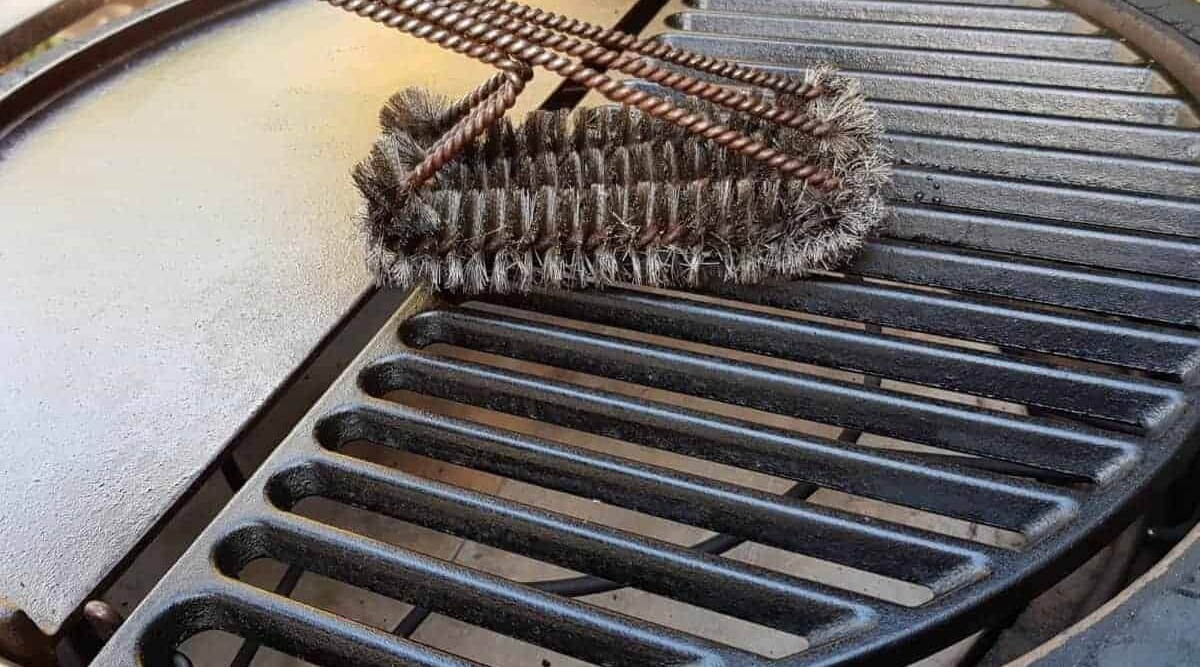
There are many reasons to purchase cast iron grill grates. They are incredibly durable and if looked after properly, will likely outlive your grill. They’re also able to retain an even heat during cooking and produce fantastic grill marks on your food.
On top of that, with continuous use and with routine seasoning they will eventually become non-stick; similar to a cast iron pan.
However, just as cast iron pots and pans can rust in your home, cast iron grill grates can also become rusty and unusable if not properly cleaned and stored.
So in this article, we’re going to explore routine maintenance, how to clean cast iron grill grates and how you can keep your investment looking good and operating properly.
Jump to:
How to Clean Cast Iron Grill Grates
This is going to sound obvious, but cannot be overstated: The best way to keep your grill clean and rust-free is to give it a good cleaning immediately after every use.
Once you’ve finished cooking and removed your food, open all vents if using charcoal, or turn up your grill to high if using gas and then close the lid to allow the grill to get hot.
This way you’re able to burn off much of your stuck on food and barbecue sauce.
Once you’ve burned off your food, you can either close your vents to extinguish your charcoal (and this charcoal can be reused,) or turn off your gas to allow the grill to cool to a point where it’s comfortable to put your hand in to clean.
While your grill is still warm, scrape the grates with a good grill brush.
A brush with a scraper is excellent here as you’re able to scrape any remaining food off your grates easily.
After cleaning your cast iron grates and making sure if they’re dry, you now want to apply a very thin coating of vegetable oil to help prevent rust from forming.
Just a wipe with a cloth or piece of kitchen towel lightly dabbed in oil is sufficient. You’re looking to apply a thin film, not coat your grates heavily.
How to Remove Rust From Cast Iron Grates
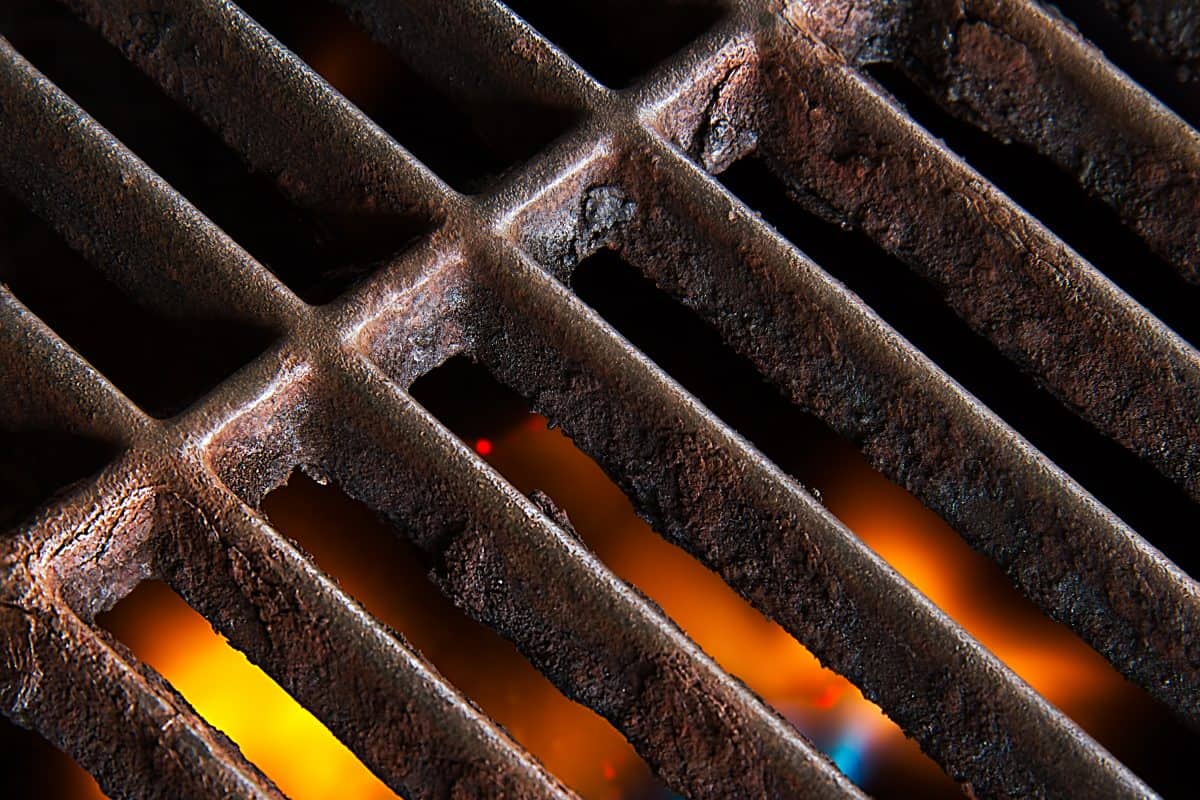
Sometimes accidents or unintentional neglect can happen, and your grates will sadly become rusty.
This can occur if you accidentally leave the cover off your grill, or if you simply don’t use it for a prolonged period and moisture gets inside the grill.
If this happens, don’t panic — there are several ways you can remove rust and restore your cast iron grates to their former glory.
Steel Wool & Soapy Water
I think I should begin by saying this: Do not wash your cast iron with soap and water unless you want to strip your seasoning and then re-season it again.
In the below video, we see how Lodge Manufacturing, one of the oldest cookware companies in the United States and one of the largest manufacturers of cast iron cookware in the world, gives recommendations on how to clean cast iron that has become rusty. The same advice applies to grates.
So long as your spouse will allow it, bring your grill grates inside the house and wash them in the sink with hot soapy water and steel wool or a stiff brush. This will remove any seasoning you’ve built up, but will also remove any surface rust, bringing your grate back to bare metal.
Once cleaned, you will need to give your grates a good rinse before drying them very thoroughly. You don’t want any moisture left behind because that will cause rust to come back again very quickly, even as quick as overnight.
The best way to dry them is a few minutes sitting in a very low oven, to completely make sure if there’s no water left in any pores.
Vinegar Soak
If your sink is large enough to lay your grill grates flat you can simply soak them in vinegar to remove any rust.
Start by making a 50/50 mixture of water and distilled white vinegar, and let the grates soak for about an hour. Then gently scrub with a kitchen scrubber or wire pad to remove any remaining rust.
Once finished scrubbing, you’ll still want to wash with soapy water to rinse off any remaining vinegar, followed by drying thoroughly in a low oven.
Self-Cleaning Oven/High Heat on the Grill
If you have a lot of rust on your grill, you may have to take more drastic measures than simply cleaning with soap and steel wool or soaking in vinegar.
A sure-fire way that’s been used to clean cast iron for years is to simply run it through your ovens self-clean cycle. If you don’t have a self-cleaning oven you can get the same results by leaving your grates in an extremely hot grill (like 600°+) for over an hour.
Once your grates have cooled (either inside the oven or on the grill), you’ll still need to give them a quick cleaning with hot soapy water to remove any carbon that may have been left behind.
Grill Cleaner or Oven Cleaner
If your grill has a lot of rust and/or baked on crud, and you don’t think any of the above methods will work for you, then a specialized grill cleaner, or even a standard oven cleaner is the be-all end-all way of stripping all your cast iron down to bare metal.
Most oven cleaners contain lye, a strong alkaline solution used for washing and cleaning.
Before you start, assemble all required materials:
- Oven cleaner
- Garbage bags
- A large enough box or container to store the grills for a couple of days while the oven cleaner works its magic
- Some safety glasses and gloves.
In a well-ventilated area, spray an even coating on your grates, place them inside garbage bags, and seal the bags airtight. Now store them for a couple of days in a warm place where no children or pets could possibly get at them.
Once the crud has all broken down, rinse the cast iron and follow it up with a wash in soapy water.
Season Your Grates After Cleaning — This is Essential!
Regardless of how you cleaned your cast iron grates, you should always season them before you put them away.
Seasoning is simply the use of fat or oil that is baked into the pores of the cast iron at such a high heat that it polymerizes, forming a tough coating that prevents rust and forms a nonstick finish over time.
If your grill is hot, and you’ve just cleaned your grates with a grill brush, one coat will be sufficient, but if you’ve just completed one of the more thorough cleaning methods described above, you’re going to want to apply a couple of coats.
You can use cooking oil to season your grates, but a product I’ve been using lately to season all my cast iron is Crisbee.
Made from bees wax, soybean & palm oil, it’s specifically designed for seasoning cast iron. I’ve been using Crisbee for about 6 months now, and my pans have never looked better!
Conclusion
How about you, what kind of grill grates do you own? Have you ever cooked with a cast iron grill grate in your backyard? Have you any tips or tricks for keeping them clean that we haven’t covered here?
Leave a comment below to tell us what kind of grates you own and how you clean them, we can all learn from each other!
Happy grilling!


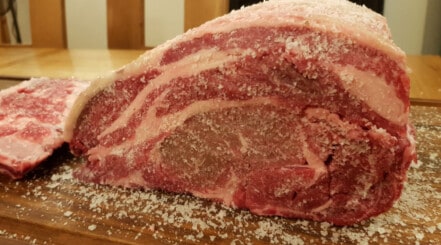
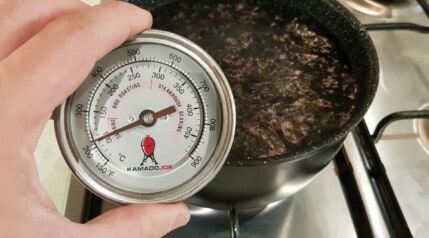
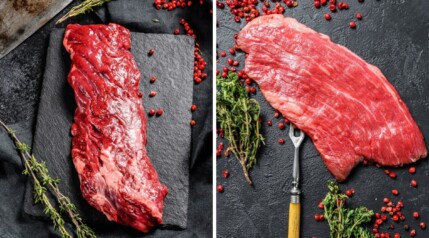

Crisbee doesn’t actually recommend their product for barbecue cast iron grilling grids because the high heat will remove “seasoning”.
Hi Isabel,
Thank you for your comment 🙂
The same could be said for any cast iron seasoning method. I’ve yet to find any that survive the high heat of a good searing session. However, for me, I still like to re-season when finished before putting the grates away.
I used to just give my grates a wipe with oil when I was finished, then put them into storage. However, I have so many cast iron grates: Some for the KJ classic, for the Big Joe, for my weber kettles, a plancha for the weber kettles, one for my go anywhere…and a few more besides.
This means that sometimes, a cast iron grate of mine may not be used for months while I use other equipment. I found that while in storage, if I only wipe them with oil then store, rust spots can and do appear almost every time. So nowadays, after I have finished grilling, I remove my grates and allow them to cool and close down the vents a bit to reduce the heat, then use the lower remaining heat in the grill to re-season the grates before putting them away. This is the only way I’ve found to prevent rust long term.
So for me, while I agree with your statement that when searing the seasoning gets burned away, (and this has been true regardless of seasoning method I have used) it is still important for me to season the grates before putting them into storage, otherwise they will rust.
It’s a never ending battle…but part of owning and using cast iron grates I’m afraid.
Can I ask what you advise? I might be missing a trick and am always looking to learn 🙂
Mark.
I have 3 long cast iron grills on my natural gas stove that need cleaning. If I place them in hot coals to remove greasy build up, how do I treat them as soon as I get them off the coals ??
Hi Cora,
Sorry, I don’t quite get the question…could you clarify a bit please?
I absolutely love to cook on the grill. My friends call me ‘Barbie Q Barbie’, but my husband just bought me a new grill with cast iron inlays. I have no idea how to work with them! Like temperatures are different inside the grill due to the cast iron, and it seems I’m either over cooking or under cooking any and all things. Suggestions would be welcome, thanks.
Hi Barb,
The only differences between cooking on cast iron and other grates (stainless steel for example) is that the cast iron grates take longer to heat up, but once they are hot they keep and hold a steadier temperature far better once the food is placed on them. Also, if you place food onto cold cast iron, it tends to stick more than it would on stainless grates, so preheating them is more essential, and giving them a light rub with oil before placing your food on.
Other than that, there’s no need to treat them differently than any other grate material.
In more detail, what is the exact issue you are experiencing?
Hi Mark,
What is your take on the best type of grill “brush” to use to clean the grates? I have been using the stainless steel brushes, but they leave little metal pieces, and I’m concerned they will find their way into the food. Thoughts?
Thanks,
Diane
Hi Diane,
That’s a very real concern! I’ve read multiple cases over the years of people ingesting the bristles and needing surgery, the stories do the rounds on Facebook every summer.
Personally, I still do use a bristle brush, but I paid for higher quality ones that don’t ever seem to shed bristles, and I make sure every time to wipe down the grates and inspect them for any bristles.
However, when I replace my current brushes, I will certainly be buying ‘bristle free’ versions. In my mind, there’s no reason not to! They are just as effective, and it removes all danger, so just seems logical to me that I should.
And I will also recommend going ‘bristle free’ to others going forward.
We are debating if our cast iron Charbroiler grates should be soaked overnight or simply scraped each night. Thoughts that keeping them in soapy hot water all night long is not the way to go. Please advise. Thanks, so much
Hi Drew,
I tend to scrape my down while still warm from the cook, then wipe with a little oil before they cool, and hey are good to go for next time. I use mine A LOT though, so this tends to be enough to keep them clean and prevent rusting. If you use yours often enough, and give them a good scrape after each use while hot, it will be enough IMO.
I have a Charbroil Red gas grill that cooks by heating a flat metal heating sheet over the gas flame. It does have cast iron grates to grill on, but my wife says she prefers the charcoal flavor over this . What type of gas grill to you prefer for flavorful grilled foods?
You’ll not get the ‘authentic charcoal flavor’ from any gas grill I’m afraid, you must use charcoal for that. You can add some smoke flavor using wood chips in a foil packet placed over the burners, but that’s about the best you can do.
Hi there. I bought Weber q1200 small gas grill and cleaning became our worst nightmare. The grill is cast iron with enamel coating. The food just gets stuck to it so bad. Every time we grill we have to spend 30min washing it. If we use grill scrubber, if, the food is still stuck to it and does not do the job. I preseason grill before cooking every time, but if I cook some meat that’s saucy and has sugar in marinade, it becomes nightmare. But even just veggie or steak creates a lot of maintenance every time we BBQ. 30min of cleaning after every BBQ? We start hating cast iron. Please help.
Hi Michael,
This part of your question concerns me: “If we use grill scrubber,” — is this a metal brush of some sort?
Thing is with enamel coated cast iron, the care is very different. It doesn’t need ‘seasoning’. You cannot use metal implements on it, because it’s prone to scratching, chipping and damage. And if it gets scratches or chips, then this is areas where non-stick properties are lost, and foods can get into and cause sticking. It sounds like this MIGHT be what’s happening here? So if you inspect the grate, can you see any damage? Any scratches and chips?
Hi, Mark.
I’m in the UK and I have recently purchased a cast iron skillet pan for using on my big green egg, I’m having the rusting issues described by others and will be trying some of the methods you’ve suggested, my question is do you feel there’s any difference in these issues when choosing cheaper or more expensive products, I ask as feeling I’d have this issue I opted for cheaper, was this a mistake .
Thanks,
Aaron.
Hi Aaron. I have two lodge cast iron pans (relatively expensive), a Weber cast iron Dutch oven, some grill grates from weber (for a gas grill), Kamado Joe cast iron, Napoleon cast iron griddles, a cheapo ‘stovetop’ reversible griddle (I forget the name, but a damn cheap one!), as well as a few other bits. And I find them all exactly the same! I literally treat all them no differently whatsoever. Cook on them the same, care for them the same, season them the same. Going cheaper will not make a difference in the short to medium term at all. So honestly, don’t sweat going cheaper, it just means you have more meat and beer money, which is always a win! 😉
I grill 1 or 2 times almost every weekend. I have an “infrared” type grill. I do not do a deep clean often. I do oil or spray the grill, sometimes olive oil the meat.
I keep a container of water and a stiff SS bristle brush inside my grill cabinet which I use before and after grilling on very hot grates. I figure that water on searing hot iron makes steam and makes the surface of the grates clean. Unscientifically, I think super hot temperatures kill any possible nasty stuff. Quick and easy.
My best friend just gave me a Oklahoma Joes offset smoker and im cleaning it up some, I can tell it has’nt ben used much. I would like to know if it’s ok touch up some on the inside and outside with black high heat paint. Thank’s Rickey.
Hi Rickey,
Paints are for the exterior of grills and smokers only. It’s very common for people to use high heat paints for the outside of their pits, but if you use it inside, it will burn off, create VOCS (volatile organic compounds) that settle on and in your food, and these are not good for your health. So paint the outside only please.